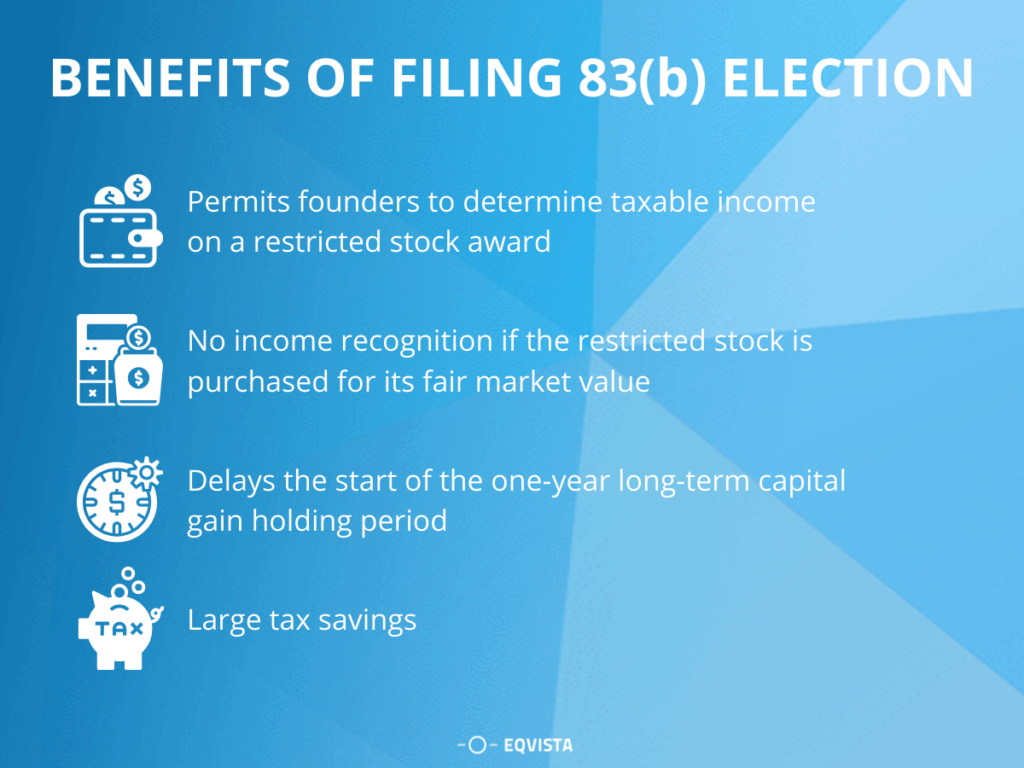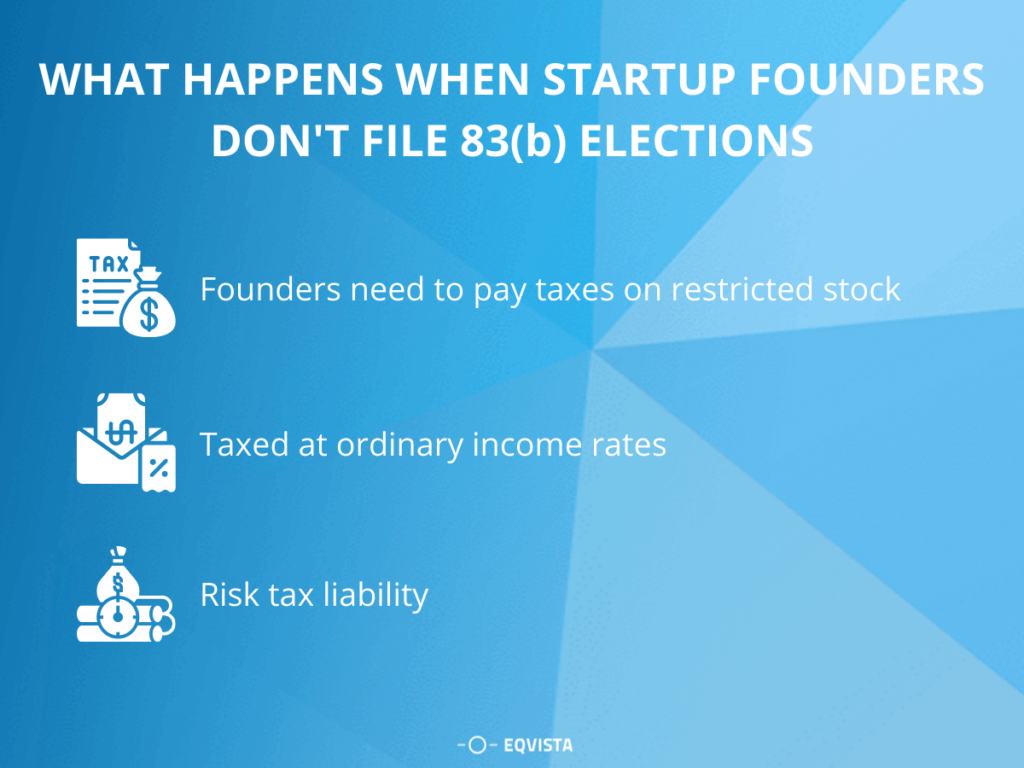Why Do Startups Need 83(b) Election?
Startups looking for venture capital and angel investment should look into 83(b) elections. 83(b) Election can help you save a lot of money in the long run, and it’s generally one move that startup founders should consider. Before making the decision though, it’s important to understand what 83(b) Election is, how it works, and how it benefits startups.

83(b) Election in Startups
Under the Internal Revenue Code (IRC), the 83(b) Election is a provision that gives startup founders the option to pay taxes based on the fair market value of the restricted stock when it is granted. This can help startup founders save a substantial amount of money from taxes.
What is 83(b) election?
The 83(b) election applies to the equity that is subject to vesting, and it instructs the Internal Revenue Service (IRS) to tax the elector for the ownership at the time of grant, rather than when the stock vests. The IRS must receive the 83(b) election documentation within 30 days of issued restricted stock.
83(b) Election and Tax Strategy
The 83(b) election allows a co-founder to pay taxes on his or her shares before the vesting period begins. This tax method simply necessitates paying tax on the $1,000 book value. The 83(b) election informs the IRS that the elector has chosen to report the difference between the purchase price and the stock’s fair market value as taxable income. The value of the shares throughout the 5-year vesting period will be unaffected because the co-founder will not be subject to any additional taxes and will be able to keep the vested shares. However, a capital gains tax will be imposed if the shares are sold for a profit.
Example of 83(b) Election
Assume you receive 100,000 shares subject to vesting, valued at $0.01 per share at the time of award, $1.00 per share at the time of vesting, and $5.00 per share when sold more than one year later in each of the scenarios below. We’ll also assume you pay the highest ordinary income tax rate and the highest long-term capital gains rate. We will not discuss employment taxes or state tax ramifications for the sake of brevity.
When your shares are worth $1,000, you timely file a Section 83(b) election within 30 days of the restricted stock issuance. You owe $370 in ordinary income tax (i.e. $1,000 multiplied by 37%). Because you made a Section 83(b) election, you only have to pay tax on the sale of the stock, not when it vests.
You recognize a taxable gain of $4.99 per share (not $5.00, because you get credit for the $0.01 per share you already took into income) and pay an extra tax of $99,800 (i.e. $499,000 x 20%) on the sale (which occurs more than one year after the date of grant). After taxes, you made $399,830 (i.e. $500,000 minus $370 minus $99,800).
Filing 83(b) Election
Keep in mind that when filing for the 83(b) election, it must be done within 30 days of your Award Date. Fill out the IRS Form 83(b) that was issued to you and mail the completed form to the IRS. It should be addressed to the IRS Service Center, where your taxes are filed.
How to File 83(b) Election?
The following actions must be accomplished within 30 days of the grant date to make an 83(b) election:
- Fill out an election letter for Section 83(b).
- Within 30 days of your grant date, mail the completed letter to the IRS
- Send your tax return to the IRS Service Center where you filed it – the address for your IRS Service Center may be found here.
- Send the letter certified mail and seek a return receipt if possible.
- Make a copy of the finished letter and send it to your boss.
- For your records, keep one copy of the completed and filed letter, as well as proof of sending.
- Founders should always contact their tax counsel to see how a Section 83(b) election applies to their specific situation.
Benefits of Filing 83(b) Election

There are various reasons why a founder might want to file an 83(b) election. Most notably, Section 83(b) of the Internal Revenue Code permits founders to determine taxable income on a restricted stock award or purchase on the date it was given rather than the date(s) the shares vest. An 83(b) election will result in no income recognition as of the acquisition date if the restricted stock is purchased for its fair market value.
Key Considerations Before Filing 83(b) Election
Although making an 83(b) election for initial issuance of restricted shares to a founder is typically a good idea, there are a few scenarios when it may not be the best option, including the following:
- You might wait and recognize the reduced value of the shares when they vest if you expect the value of the shares to decline. You would have paid more tax than necessary on the shares if you had made an 83(b) election.
- There’s no reason to pay tax on the value of shares you’ll never receive if you don’t anticipate staying with the company through any vesting periods or reaching the required milestones.
- There are no exceptions to filing an 83(b) election with the IRS within 30 days of receiving the property.
- For I shares that are fully vested at the time of issuance and (ii) stock options, an 83(b) election is not required.
- 83(b) elections should be sent certified mail with return receipt requested since the individual filing the election bears the burden of proving that the election was filed on time.
- Once made, an 83(b) election is usually irreversible.
Who Should File for 83(b) Election?
There are a few reasons why you might want to make an 83(b) election. If you fall into one of these categories, and 83(b) election could help you save money on your taxes.
- Stock Option Holders: If you have the option to exercise your stock options before they vest, you can do so and file an 83(b) election within 30 days of doing so. In this manner, if your company’s stock price rises, you may be able to reduce your future tax liability.
- Startup Founders: Compensation for firm founders or owners may involve a considerable amount of restricted shares in some organizations, particularly startups (not to be confused with restricted stock units or RSUs). Restricted stock refers to a firm’s shares that are subject to particular conditions, such as vesting and forfeiture (losing your shares if you leave the company).
Many restricted shares may be issued to key personnel, with the value of the shares increasing dramatically from the time of grant through vesting. These employees can save money by electing the 83(b) election, which shifts their tax classification from regular income taxes to capital gains taxes.
What Happens When Startup Founders Don’t File 83(b) Elections?

A founder will have to pay taxes on restricted stock grants at each vesting date if a Section 83(b) election is not submitted by the deadline. The amount by which the stock’s value on the vesting date exceeds the purchase price, if any, would be taxed at ordinary income rates.
If the value of the shares has increased significantly over time, this could result in a considerable tax liability. The 83(b) election, notwithstanding its advantages, is not without risk. When you make a Section 83(b) election, the date on which taxable income is recorded is accelerated from the vesting date to the date the restricted stock is awarded or purchased.
Manage your startup stock options with Eqvista!
Whether you already have stock options that include options as part of the compensation package, you’re bound to have concerns about your investment. Knowing how to value your options can help you feel more confident when managing your finances. Many employees have the same question about options, which might uncover life-changing money. With Eqvista, we can help you manage your company’s stocks. Get in touch with us to learn more about our services!
